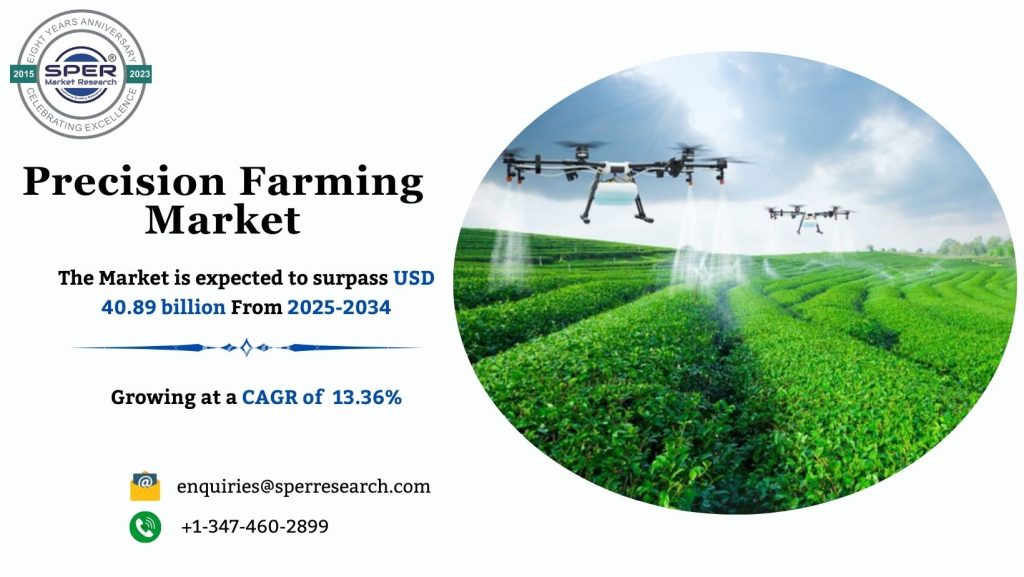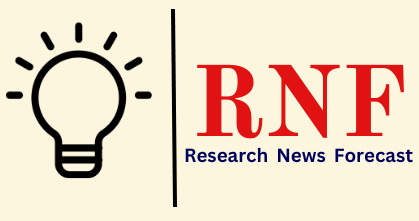Precision Farming Market Size, Share and Trends 2034

Precision farming, also called precision agriculture, is an advanced farming method that leverages modern technologies to enhance crop production and resource efficiency. It uses tools like GPS, IoT sensors, drones, and data analytics to monitor field conditions, such as soil health, weather changes, and crop performance in real time. This technology-driven approach enables farmers to apply water, fertilizers, and pesticides more accurately and only where needed. As a result, it improves yield, reduces input costs, and minimizes environmental impact. By making data-informed decisions, precision farming supports both higher agricultural productivity and sustainable land management practices.
According to SPER Market Research, ‘Global Precision Farming Market Size- By Type, By Application, By Category, By Source – Regional Outlook, Competitive Strategies and Segment Forecast to 2034’ state that the Global Precision Farming Market is predicted to reach 40.89 billion by 2034 with a CAGR 13.36%.
Drivers:
Several factors are driving the growth of precision farming worldwide. A growing emphasis on sustainable agriculture is a key contributor, encouraging reduced chemical use, efficient water management, and enhanced biodiversity—all vital for long-term food security. Precision farming enables these outcomes by using technologies such as soil sensors, satellite imagery, and data analytics to apply resources more precisely, reducing waste and environmental impact. Government and institutional support is also playing a crucial role. Recent initiatives in India and international efforts by organizations like FAO and IFAD are promoting eco-friendly practices, further accelerating the adoption of precision agriculture as a scalable sustainability solution.
Request a Free Sample Report: https://www.sperresearch.com/report-store/precision-farming-market?sample=1
Restraints:
The precision farming market, while growing, faces several key challenges. One major hurdle is the high upfront cost of technologies like sensors, drones, and data analytics tools, which can be difficult for small and mid-sized farmers to afford. Many farmers also lack the technical skills and training needed to operate these systems effectively. In rural areas, limited internet connectivity hinders real-time data usage. Concerns over data privacy and ownership add further complexity. Additionally, the absence of standardized practices and adequate infrastructure in many developing regions slows broader adoption. Overcoming these obstacles is essential to make precision agriculture more accessible and scalable. North America dominates the precision farming market, supported by early adoption of advanced technologies, strong government initiatives, and robust infrastructure. In Canada, public investments are encouraging sustainable approaches in fruit farming. Meanwhile, in the United States, organizations such as the National Institute of Food and Agriculture work alongside universities to promote awareness and drive the development of cutting-edge agricultural technologies. Some significant market players are AGCO Corporation, Raven Industries Inc., Deere and Company, Topcon Corporation, AgEagle Aerial Systems Inc. (Agribotix LLC), and DICKEY-john Corporation.
For More Information, refer to below link: –
Precision Farming Market Share
Related Reports:
Agricultural Fumigants Market Growth
Europe Agricultural Sprayer Market Growth
Follow Us –
LinkedIn | Instagram | Facebook | Twitter
Contact Us:
Sara Lopes, Business Consultant — USA
SPER Market Research
enquiries@sperresearch.com
+1–347–460–2899





